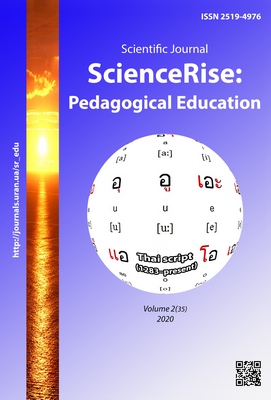Continuous education as the basis of sociocultural adaptation
DOI:
https://doi.org/10.15587/2519-4984.2020.199287Keywords:
continuing education, professional mobility, sociocultural adaptation, self-realization, socialization, person, Homo HeuristicusAbstract
The relevance of the study is due to the demand for universal, heuristic over-professional skills that allow a person to be successful and competitive in today's labor market. Today, an important factor in the success of transformations is the ability to constantly adapt, which may be possible if the quality of the continuing education system is maintained. Therefore, we consider the content of education, bearing in mind a set of specially selected, socially significant and necessary knowledge, abilities and skills, the acquisition of which is necessary for the formation of an individual and the active inclusion of it in society. The purpose of our study is to determine the role of sociocultural adaptation in the continuing education of a person with the high competitive ability in today's society. It is in this, first of all, the value of a professional mobile person.
The study outlines the main functions of continuing education and highlights the three main super-professional skills that enable one to be successful and competitive in today's job market. The authors describe the experience of effective cooperation with representatives of various socio-economic professions, potential employers, specialists, parents, students, which allows not only practical skills in the chosen profession to students, but also to learn new technologies, knowledge of professional tools and methods, necessary for innovative activity of specialists. The result of the successful interconnection of sociocultural adaptation and socialization of the modern person is the willingness to constantly raise the educational level, the need to realize their personal potential, the ability to independently acquire new knowledge and skills. The most important task of continuous education is to create the conditions for personal and professional growth of a person, the development of his/her creative, creative abilities, professional competence in the conditions of modern society.
The proposed research contributes to the formation of a system of continuous education, which focuses on the continuous restoration and preservation of existing labor resources through the creation of a system of social elevators, the creation of a system of quality continuing education, which corresponds to the competencies of the modern advanced society, the expansion of a system of free continuous education with mandatory 100% internet access to Ukraine at 4G and above, enhancing the prestige of higher education and creating a much larger number of free places in SVR in each region of Ukraine
References
- Dave, R. (1973). Lifelong Education and School Curriculum. Hamburg, 14–25.
- Nychkalo, N. H.; Ziaziun, I. A. (Ed.) (2000). Neperervna profesiina osvita: problemy, poshuky, perspektyvy. Kyiv: Vipol, 636.
- Sysoieva, S. O. (2006). Osnovy pedahohichnoi tvorchosti. Kyiv: Milenium, 346.
- Andrushchenko, V., Huberskyi, L. (2012). Filosofiia yak teoriia ta metodolohiia rozvytku osvity. Filosofiia osvity: poshuk priorytetiv. Book 3. Kyiv: «MP Lesia», 568.
- Sandeep, M. S., Ravishankar, M. N. (2017). Sociocultural transitions and developmental impacts in the digital economy of impact sourcing. Information Systems Journal, 28 (3), 563–586. doi: http://doi.org/10.1111/isj.12149
- Tansley, C., Kirk, S. (2018). You were created – talent mobility in emerging markets. Thunderbird International Business Review, 60, 39–51. doi: http://doi.org/10.1002/tie.21887
- Borinshtein, Ye., Atamaniuk, Z., Ortynska, N. (2017). Education: Dialogical search and socio-cultural adaptation. Science and education, 12, 140–145.
- Binde, J. (2000). L'education au XX le siecle: l'education pour tous tout au long de la vie. Futuribles, 250, 5–21
- Pavlyk, N. P. (2016). Zmist poniattia neperervna osvita: proceedings. Aktualni problemy v systemi osvity: zahalnoosvitnii navchalnyi zaklad – douniversytetska pidhotovka – vyshchyi navchalnyi zaklad. Kyiv: NAU, 180–182. Available at: http://eprints.zu.edu.ua/23616/1/%D0%9F%D0%B0%D0%B2%D0%BB%D0%B8%D0%BA_%D0%9A%D0%BE%D0%BD%D1%84%D0%B5%D1%80%D0%B5%D0%BD%D1%86%C2%A6%D1%8F_%D0%9D%D0%90%D0%A3.PDF
- Abeuova, D., Muratbekova‐Touron, M. (2019). Global talent management: Shaping the careers of internationally educated talents in developing markets. Thunderbird International Business Review, 61 (6), 843–856. doi: http://doi.org/10.1002/tie.22085
- Samorealizatsiia i smysl zhizni. Available at: https://amurmedia.ru/news/12.05.2015/samorealizaciya-i-smysl-zhizni.html (Last accessed: 24.03.2020)
- Borinshtein, Ye. R., Kisse, A. I., Orlenko, I. M. (2018). Sotsyokulturnaia adaptatsyia ynostrannoi molodezhy k ukraynskoi studencheskoi srede: antroposotsyohenetycheskyi kontekst. Hrani. Naukovo-teoretychnyi almanakh, 21 (12), 42–52.
- European Commission (EC) (2000). A Memorandum on Lifelong Learning. Commission Staff Working Paper. Brussels: European Commission. Available at: https://arhiv.acs.si/dokumenti/Memorandum_on_Lifelong_Learning.pdf Last accessed: 18.01.2020
- O'Connell, P. J. (1999). Adults in Learning: An International Comparison of Continuing Education and Training. Available at: https://www.semanticscholar.org/paper/Adults-in-Training%3A-An-International-Comparison-of-O'connell/b7423ae39f2d1da0aff502db684471694c5f63a2
- Koenig, D. (2016). The Year 2015 in Sociocultural Anthropology: Material Life and Emergent Cultures. American Anthropologist, 118 (2), 346–358. doi: http://doi.org/10.1111/aman.12530
- "Osvita protiahom zhyttia: svitovyi dosvid i ukrainska praktyka". Analitychna zapyska. Natsionalnyi instytut stratehichnykh doslidzhen. Available at: http://old2.niss.gov.ua/articles/252/ Last accessed: 17.01.2020
- Kremen, V. H. (2005). Osvita i nauka v Ukraini – innovatsiini aspekty. Stratehiia. Realizatsiia. Rezultaty. Kyiv: Hramota, 448.
- Osvita doroslykh: bibliohrafichnyi pokazhchyk (2016). Kyiv: TOV «DKTs-Tsentr», 144.
Downloads
Published
How to Cite
Issue
Section
License
Copyright (c) 2020 Evgenij Borinshteyn, Irina Orlenko

This work is licensed under a Creative Commons Attribution 4.0 International License.
Our journal abides by the Creative Commons CC BY copyright rights and permissions for open access journals.
Authors, who are published in this journal, agree to the following conditions:
1. The authors reserve the right to authorship of the work and pass the first publication right of this work to the journal under the terms of a Creative Commons CC BY, which allows others to freely distribute the published research with the obligatory reference to the authors of the original work and the first publication of the work in this journal.
2. The authors have the right to conclude separate supplement agreements that relate to non-exclusive work distribution in the form in which it has been published by the journal (for example, to upload the work to the online storage of the journal or publish it as part of a monograph), provided that the reference to the first publication of the work in this journal is included.








